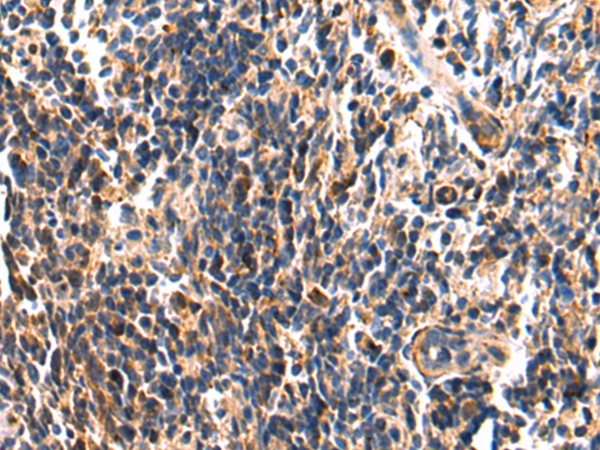
| WB | 咨询技术 | Human,Mouse,Rat |
| IF | 咨询技术 | Human,Mouse,Rat |
| IHC | 1/50-1/200 | Human,Mouse,Rat |
| ICC | 技术咨询 | Human,Mouse,Rat |
| FCM | 咨询技术 | Human,Mouse,Rat |
| Elisa | 1/5000-1/10000 | Human,Mouse,Rat |
| Aliases | ALO17; MYMY2; MYSTR; NET57; C17orf27; KIAA1618 |
| Host/Isotype | Rabbit IgG |
| Antibody Type | Primary antibody |
| Storage | Store at 4°C short term. Aliquot and store at -20°C long term. Avoid freeze/thaw cycles. |
| Species Reactivity | Human |
| Immunogen | Fusion protein of human RNF213 |
| Formulation | Purified antibody in PBS with 0.05% sodium azide and 50% glycerol. |
+ +
以下是3篇关于 **RNF213抗体** 的参考文献及简要摘要:
---
1. **文献名称**: *"Mutations in RNF213. a novel ubiquitin ligase gene, cause familial moyamoya disease"*
**作者**: Liu W, et al.
**摘要**: 该研究首次发现 **RNF213基因突变** 是家族性烟雾病(Moyamoya病)的主要致病因素。通过全外显子测序和抗体检测,发现RNF213蛋白可能通过泛素化通路调节血管生成,突变导致其功能异常。
2. **文献名称**: *"RNF213 mutations in East Asian patients with intracranial arterial stenosis/occlusion"*
**作者**: Kamada F, et al.
**摘要**: 研究分析了东亚人群中颅内动脉狭窄/闭塞患者的RNF213基因突变,发现 **p.R4810K突变** 与疾病高度相关。利用抗体验证了突变蛋白的表达模式,并探讨了其通过血管内皮细胞功能紊乱致病的机制。
3. **文献名称**: *"RNF213 regulates angiogenesis through the TGF-β pathway in moyamoya disease"*
**作者**: Morimoto T, et al.
**摘要**: 通过免疫组化和Western blot实验,发现RNF213抗体可特异性识别病变血管组织中的蛋白表达。研究揭示RNF213突变通过干扰TGF-β信号通路,导致血管平滑肌细胞异常增殖,进而引发烟雾病特征性血管狭窄。
4. **文献名称**: *"RNF213 functions as a ubiquitin ligase in vitro and influences angiogenesis in zebrafish models"*
**作者**: Kobayashi H, et al.
**摘要**: 体外实验表明RNF213具有泛素连接酶活性,并利用特异性抗体证实其在斑马鱼模型中调控血管生成。突变型RNF213的泛素化能力显著降低,提示其功能缺失可能引发血管发育异常。
---
以上研究均围绕RNF213基因/蛋白在血管疾病中的作用,涉及抗体的应用场景包括突变蛋白检测、表达定位及功能机制分析。
×